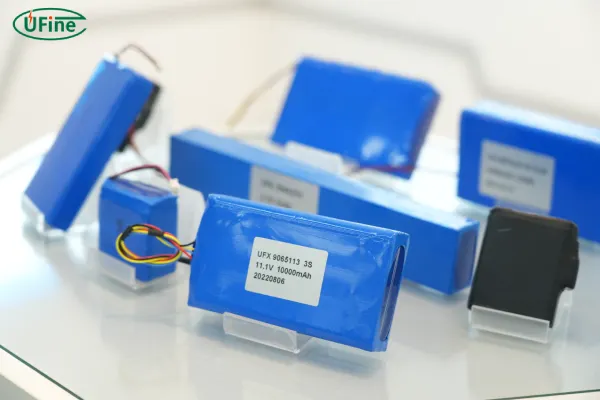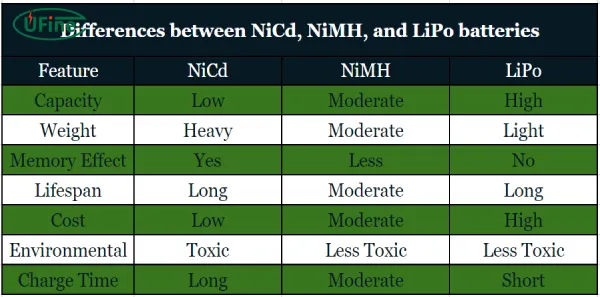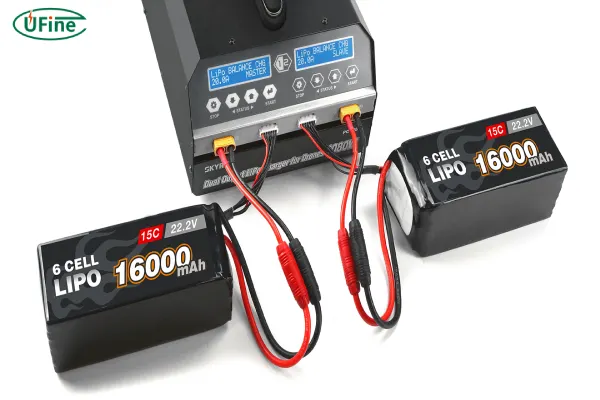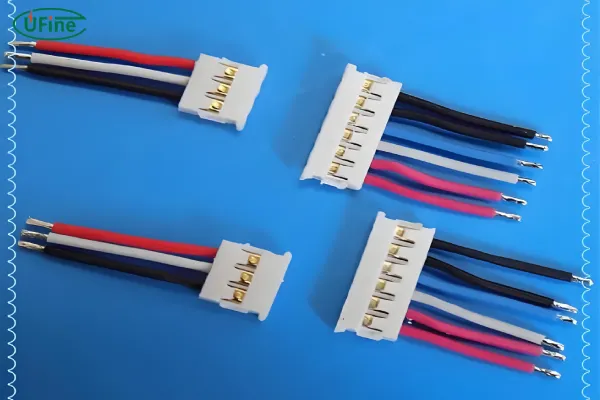In the world of RC cars, the choice of battery can significantly impact performance and enjoyment. Many enthusiasts prefer LiPo batteries for their exceptional power and lightweight design. But why exactly are LiPo batteries the go-to choice? This article will explore the reasons behind this preference and guide you on how to select the right battery for your RC car.
Part 1. What to consider when buying an RC car battery?

Choosing the right battery for your RC car is crucial for optimal performance. Here are the key factors to consider:
Capacity
Measured in milliamp hours (mAh), capacity indicates how long a battery will last on a single charge. A higher capacity means longer run times, which is essential for extended play sessions without frequent recharging.
Voltage
Voltage affects the power and speed of your RC car. Most RC cars require a specific voltage to function correctly. Make sure the battery you choose matches your car’s voltage requirements to avoid damaging the motor or electronics.
Weight
The weight of the battery can influence the car’s handling and speed. Lighter batteries contribute to better agility and faster acceleration, providing a competitive edge in races.
Size
Ensure the battery fits snugly within the battery compartment of your RC car. An improper fit can lead to connectivity issues or damage to the battery and car.
Discharge Rate
The discharge rate, or “C” rating, shows how quickly the battery can deliver power. A higher C rating allows for more power output, which is beneficial for high-speed or high-torque applications.
Price
While it’s tempting to go for the cheapest option, it’s important to balance cost with quality. Investing in a good battery can enhance performance and longevity, saving money in the long run.
Brand Reputation
Opt for reputable brands known for quality and reliability. Well-known brands often provide better customer support and warranty options, ensuring peace of mind.
Part 2. Differences between NiCd, NiMH, and LiPo batteries
Choosing the right battery type is crucial for performance and safety. Let’s compare NiCd, NiMH, and LiPo batteries in detail:
NiCd (Nickel-Cadmium)
- Capacity: Lower compared to others, making it less ideal for long runs.
- Weight: Heavier due to the metal components, which can slow down your RC car.
- Memory Effect: Requires full discharge before recharging to maintain capacity.
- Lifespan: Can last long if properly maintained, but requires regular cycling.
- Cost: Generally cheaper, but less efficient.
- Environmental Impact: Contains toxic metals, making disposal challenging.
- Charge Time: Longer charge cycles compared to modern alternatives.
NiMH (Nickel-Metal Hydride)
- Capacity: Higher than NiCd, providing better run times.
- Weight: Moderately heavy, impacting performance but better than NiCd.
- Memory Effect: Less prone to memory issues, but still benefits from full discharge occasionally.
- Lifespan: Moderate lifespan, though performance can degrade over time.
- Cost: Mid-range pricing, offering a balance of performance and affordability.
- Environmental Impact: Less toxic than NiCd but still requires careful disposal.
- Charge Time: Faster than NiCd, but not as quick as LiPo.
LiPo (Lithium Polymer)
- Capacity: High energy density, allowing for extended run times and superior power.
- Weight: Lightweight, enhancing speed and agility in RC cars.
- Memory Effect: No memory effect, simplifying charging and maintenance routines.
- Lifespan: Long lifespan with proper care, though sensitive to overcharging and discharging.
- Cost: Higher initial cost, but offers superior performance and longevity.
- Environmental Impact: Less toxic, but requires responsible disposal to prevent pollution.
- Charge Time: Quick charging capabilities, reducing downtime between uses.
Comparison Table
Which Battery is Better?
For most RC car enthusiasts, LiPo batteries are the clear winner. Their high capacity, lightweight design, and rapid charging make them perfect for high-performance RC cars. While the cost is higher, the benefits in terms of speed and longevity make them worth the investment.
Part 3. Why more people choose RC LiPo batteries?
LiPo batteries have become the preferred choice for several reasons:
High Energy Density
LiPo batteries provide more power in a smaller package, allowing for longer run times and more powerful performance. This high energy density is ideal for competitive racing and high-speed applications.
Lightweight Design
The lightweight nature of LiPo batteries improves the agility and acceleration of RC cars. This makes them faster and more responsive, providing a better driving experience.
No Memory Effect
Unlike NiCd batteries, LiPo batteries do not suffer from the memory effect. This means they don’t need to be fully discharged before recharging, simplifying maintenance and extending lifespan.
Quick Charging
LiPo batteries charge faster than their NiCd and NiMH counterparts. This reduces downtime and allows for more time on the track, which is especially important for competitive racers.
Versatility
Available in various sizes and configurations, LiPo batteries can fit a wide range of RC cars, from small models to large, powerful trucks. This versatility makes them suitable for all types of RC enthusiasts.
Part 4. Types of RC LiPo battery chargers
To keep your LiPo batteries in top condition, choosing the right charger is essential. Here are the common types of LiPo battery chargers:
Basic Chargers
These are simple and affordable, making them suitable for beginners. They offer straightforward functionality but may lack advanced features like balance charging.
Balance Chargers
Balance chargers ensure each cell in a LiPo battery is charged evenly. This balance is crucial for maintaining the health and performance of multi-cell batteries.
Smart Chargers
Equipped with advanced features, smart chargers offer automatic shut-off, charge monitoring, and adjustable settings. They optimize the charging process and enhance battery lifespan.
Dual/Quad Chargers
For those with multiple batteries, dual or quad chargers can charge several batteries simultaneously. This saves time and is convenient for frequent users.
Field Chargers
Portable and compact, field chargers are designed for on-the-go charging. They’re perfect for field use, allowing you to charge batteries without access to a power outlet.
Part 5. Best RC LiPo battery charger brands
Choosing a reputable charger brand ensures quality and reliability. Here are seven top brands known for their excellent RC LiPo battery chargers:
- SkyRC: Offers innovative designs and reliable performance, favored by many enthusiasts.
- iMAX: Known for affordability and user-friendly interfaces, making them accessible to beginners.
- Hitec: Provides high-quality chargers with advanced features and robust safety measures.
- Traxxas: Specializes in RC chargers with a focus on durability and ease of use.
- ISDT: Features compact, high-performance chargers equipped with smart technology.
- Turnigy: Offers a range of versatile and affordable chargers suitable for various needs.
- Dynamite: Known for smart charging solutions with excellent performance and safety.
Choosing a charger from these brands ensures you get a product that meets high standards.
Part 6. Do I need to buy RC battery connectors?
When setting up your RC car, you might wonder if purchasing battery connectors is necessary. Let’s explore the types and their importance:
Types of RC Battery Connectors
- Deans/T-Plug: Widely used for high-current applications, known for their reliable connection.
- XT60: Popular for their secure fit and ease of use, ideal for moderate power needs.
- EC3/EC5: Known for their robust and durable design, suitable for high-power setups.
- Traxxas Connector: Offers plug-and-play functionality, designed for Traxxas models.
Why Buy RC Battery Connectors?
- Compatibility: Ensures a secure and proper fit between your battery and RC car, preventing connectivity issues.
- Performance: High-quality connectors reduce resistance, improving power delivery and efficiency.
- Safety: Secure connections prevent loose wires, reducing the risk of short circuits and battery damage.
While not always necessary, investing in good connectors can enhance your RC car’s performance and ensure safe operation.
In conclusion, choosing the right battery for your RC car can significantly enhance your experience. LiPo batteries offer unmatched performance, making them the preferred choice for many enthusiasts. By understanding the differences between battery types and considering the right chargers and connectors, you can maximize your RC car’s potential and enjoy longer, faster runs.
Related Tags:
More Articles

How to Choose the Best Floor Scrubber Battery for Commercial Cleaning?
Selecting the ideal floor scrubber battery ensures a long runtime, rapid charging, and minimal maintenance for efficient commercial cleaning operations.
Battery for Blower vs Battery for Leaf Vacuum: Which One Should You Choose?
Battery for blower vs leaf vacuum—learn the key differences in power, fit, and runtime to choose the right battery for your outdoor tool needs.
How to Choose the Right Battery for Blower?
Choosing the right blower battery? Consider voltage, capacity, chemistry & usage. This guide helps match the best battery for peak performance.
How to Choose the Best Insulated Battery Box for Lithium Batteries?
Choosing the Best Insulated Battery Box for Lithium Batteries? Discover key factors such as size, material, and safety for optimal protection and performance.
7 Critical Elements on a Lithium Battery Shipping Label
What must be on a lithium battery shipping label? Learn 7 key elements to ensure safety, legal compliance, and correct handling across all transport modes.






